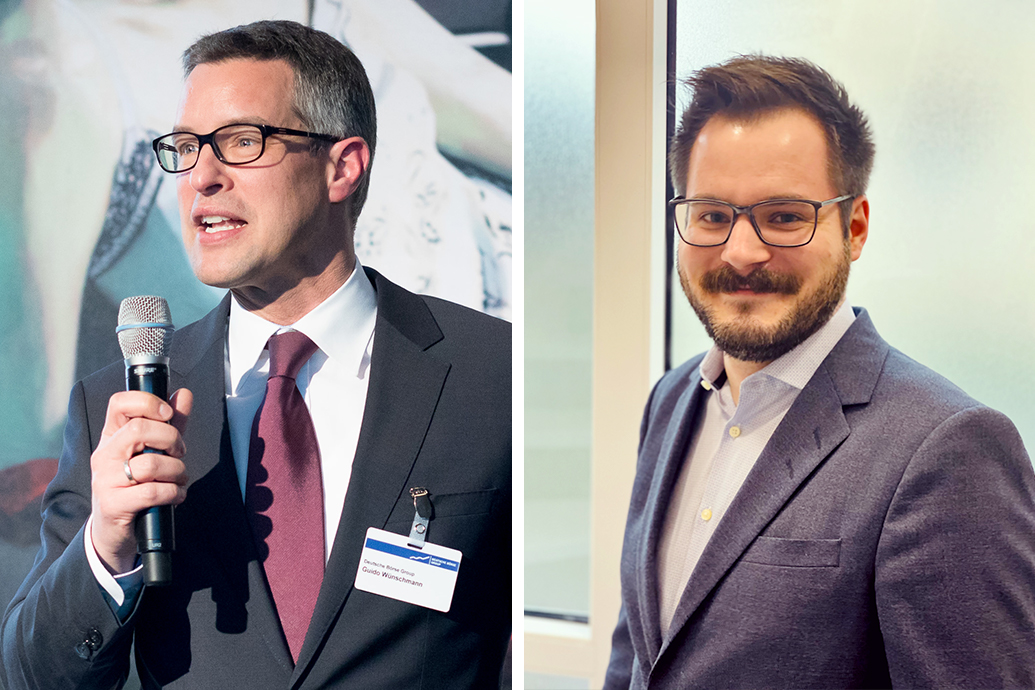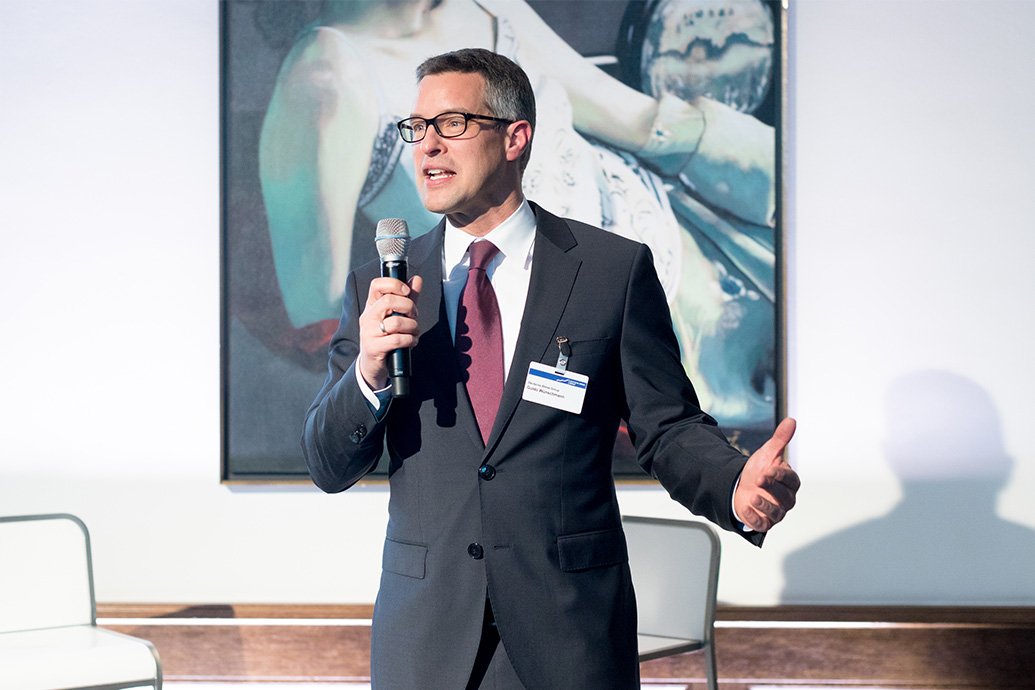Guido Wünschmann & Daniel Sonnenburg
Deutsche Börse Group
Sustainable Finance – what does that mean to you?
Guido Wünschmann, Head of Berlin Office, Group Regulatory Strategy: First of all, sustainable finance is the financial sector’s ability to accompany and finance the necessary transition of the real economy in a successful and viable manner. However, at the same time, the financial sector must undergo a transition itself to ensure financial stability and to maintain individual competitiveness. We have observed the reasons for this on a daily basis – be it the progressing climate change or the Covid-19 pandemic.
Ultimately, these are profound structural changes – and contrary to the claims often made, these are not ideological issues for companies, but rather rationally and strategically regarded from a strictly financial standpoint. That’s because the more information I have about sustainability risks and opportunities in my value chain, the better I can manage my company and also maintain a profitable business model in the future.

What do you think is the key to the successful development of the sustainable finance movement?
Daniel Sonnenburg, Government Relations & Political Affairs, Group Regulatory Strategy: How to address the topic of complexity. Sustainability always refers to the entire system and both our economic system and our society are complex. This leads to not only additional risks, but also inevitably conflicting goals. Integrating sustainability entirely into the core processes of financial market actors, ESG risk modelling or adapting IT systems, all pose a great challenge and can only be achieved with an interdisciplinary approach as well as a solid database.
Wünschmann: The complexity is also reflected in the regulatory framework and should not be underestimated. When it comes to global challenges and in a multi-level system such as the European Union or also the international community, then this requires a coherent coordination of policies and approaches. However, political objectives and the corresponding regulations can only become effective, if they are implemented by someone. This applies to the management level, but especially those below. Cooperation and systematic knowledge development within and between the financial industry and real economy, the supervisory and regulatory authorities as well as society overall are therefore now more important than ever.
What role does Deutsche Börse play here?
Wünschmann: There are several ways. We are not just a market infrastructure, but are ourselves a listed company and member of society with different respective stakeholder groups.
To start with, transparency belongs to the core business of Deutsche Börse Group and is an integral part of a functioning market. With respect to sustainability information, the market itself plays an important role, although there is still not a generally accepted definition. This is where policymakers and regulations come into play. The EU is the driving force regarding the harmonisation and standardisation in the field of sustainable finance, also on an international scale. We accompany this process across all levels by fostering an active dialogue, after all, we operate in a strongly regulated environment. This is not only a matter of providing information, but rather organising markets and creating trust. Take for example one of our subsidiaries, the European Energy Exchange, which plays a key role in European emissions trading. Organised markets also always mean a further reduction in systemic risk, which is an advantage in terms of financial market stability.
Based on this, financial markets are making great progress when it comes to integrating sustainability risks and opportunities into price mechanisms. Investors are increasingly requesting decision-relevant information. Ultimately, the transition of the real economy would be more difficult, less efficient and significantly more expensive without capital markets. Furthermore, innovation plays a decisive role in transition processes and the necessary mobilisation of capital primarily occurs on the capital market.
Deutsche Börse is now also adding another key component to its services, as one of the leading providers of sustainability data. These data form the foundation for each investment decision, provide information about risks and opportunities as well as sustainability-related impacts.
Daniel Sonnenburg: In addition, our product and service portfolio enables a capital allocation in keeping with the Sustainable Development Goals or the European Green Deal, for example thanks to our ESG indices. As the leading and most liquid ESG derivatives exchange worldwide, we are also enhancing the risk management opportunities for our clients. It is in the nature of things that pricing in this regard is future-oriented, representing another advantage for sustainability and the efficient functioning of the underlying market.
Throughout the process, our product development occurs in response to market signals and in collaboration with our entire ecosystem and its actors. Demand usually depends on changing investment behaviour and regulatory developments. Once again, this demonstrates the role of a stock exchange, which maintains contact with all stakeholders, while bringing them together. Deutsche Börse Group is therefore always committed to the entire system. We coordinate, for example, the sectoral data project within the scope of the TCFD think tank of the GSFCG and are a member of the Climate Disclosure Advisory Group of the United Nation’s Sustainable Stock Exchanges Initiative. The first of which offers different user perspectives with respect to sustainable finance in the financial industry and real economy, the second one is working on the goal of creating globally consistent recommendations for sustainability reporting by listed issuers.

“The ongoing search for striking a balance between too weak requirements and over-regulation is what motivates and fascinates me. If we can manage to maintain this balance, then we can use the momentum of the capital markets to create a future worth living, minimise transition risks right up to a more sustainable economy and society, and facilitate democratic participation in the wide range of opportunities in the future.”
What is your personal goal?
Guido Wünschmann: Obviously, as the Head of the Berlin Office of Deutsche Börse Group, I focus on the political and regulatory framework. The ongoing search for striking a balance between too weak requirements and over-regulation is what motivates and fascinates me. If we can manage to maintain this balance, then we can use the momentum of the capital markets to create a future worth living, minimise transition risks right up to a more sustainable economy and society, and facilitate democratic participation in the wide range of opportunities in the future.
Daniel Sonnenburg: As Deutsche Börse Group, we can make an important contribution to a climate-neutral, socially just and, at the same time, competitive Europe that will serve as a model for others throughout the world. Given its special economic structure and distinct industrial basis, this also requires a pronounced voice of Germany as part of the European Union.
„In order to stop climate change – the effects of which have long since been noticeable – enormous investments are needed. This is why we are embracing the idea of private capital also being invested according to the principles of sustainability. The Cluster aims at further promoting this movement.“
Hessian Minister of Economy, Tarek Al-Wazir


